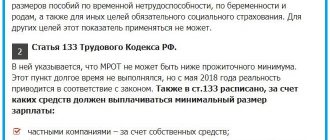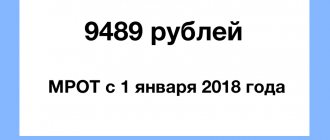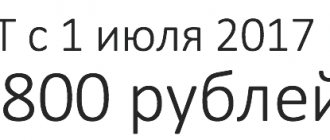The minimum wage (SMW) is the minimum possible wage that an enterprise can charge its employee.
This value is also used in calculations when determining the amount for payments of unemployment benefits and temporary disability. An employer cannot pay its employee a salary below the minimum level, otherwise he will incur a fine. The current minimum wage depends on several indicators:
- national pricing policy;
- the needs of residents and non-residents working on the territory of the Russian Federation;
- increasing government production efficiency indicators;
- increasing government production efficiency indicators;
- reducing unemployment;
- current inflation rate.
From July 1, 2022, the minimum wage will be 7,800 rubles for Russian citizens per month (
).
This law was signed by Vladimir Putin on December 20, 2016. Previously it was reported that the increase would be 17.33% already in January, but in fact it is only 4% and July 2022. From January 1, 2022, there will be no increase in the minimum wage; it will remain at the same level of 7,500 rubles .
From July 1, 2016, the minimum wage is 7,500 rubles for Russian citizens per month (
,
), the State Duma approved the law on increasing the minimum wage on May 17, 2016, Russian President Vladimir Putin signed the law on June 2, 2016), this is 1,296 rubles higher than the previous figure.
Minimum wages by region
With changes and additions from 07/01/2016
| Region of the Russian Federation | Minimum wage in 2016 |
| Central Federal District | |
| Belgorod region | 8694 |
| Bryansk region | 6500 |
| Vladimir region | 6204 (for budgetary organizations) 7000 (for extra-budgetary organizations) |
| Voronezh region | 6204 (for budgetary organizations) 8787 (for extra-budgetary organizations) |
| Ivanovo region | 8645 |
| Kaluga region | at the subsistence level |
| Kostroma region | 7500 (for public sector organizations) at the subsistence level (for non-budgetary organizations) |
| Kursk region | 7500 (for public sector organizations) at the subsistence level (for non-budgetary organizations) |
| Lipetsk region | 6000 (for public sector organizations) not less than 1.2 subsistence level (for non-budgetary organizations) |
| Moscow region | 12500 |
| Oryol Region | 9778 |
| Ryazan Oblast | 6350 (for budgetary organizations) 7500 (for non-budgetary organizations) |
| Smolensk region | 6200 |
| Tambov Region | 6240 (for budgetary organizations) 7500 (for extra-budgetary organizations) |
| Tver region | 7500 (for budgetary organizations) 7280 (for non-budgetary organizations) |
| Tula region | 11000 (from 01.08.2016) (for budgetary organizations) 13000 (from 01.08.2016) (for non-budgetary organizations) |
| Yaroslavl region | 6000 (for budgetary organizations) 8021 (for extra-budgetary organizations) |
| Moscow | 17300 |
| Northwestern Federal District | |
| Republic of Karelia | 7213 (for public sector organizations in the northern regions: Belomorsky district, Kalevalsky district, Kemsky district, Loukhsky district, Kostomuksha) 5796 (for public sector organizations in other districts) at the subsistence level (for non-budgetary organizations) |
| Komi Republic | 6500 |
| Arhangelsk region | 7500 |
| Vologda Region | 7500 |
| Kaliningrad region | 10000 |
| Leningrad region | 7800 |
| Murmansk region | 13650 |
| Novgorod region | 6204 (for public sector organizations) at the subsistence level (for non-budgetary organizations) |
| Pskov region | 7500 |
| Saint Petersburg | 11700 |
| Nenets Autonomous Okrug | 6204 |
| Southern Federal District | |
| Republic of Adygea | 7500 |
| Republic of Kalmykia | 7500 |
| Krasnodar region | 7500 (for public sector organizations) at the subsistence level (for non-budgetary organizations) |
| Astrakhan region | 7500 (for budgetary organizations) 7350 (for non-budgetary organizations) |
| Volgograd region | 7500 (for public sector organizations) not less than 1.2 subsistence minimum (for non-budgetary organizations) |
| Rostov region | 7500 |
| North Caucasus Federal District | |
| The Republic of Dagestan | 7500 |
| The Republic of Ingushetia | 7500 |
| Kabardino-Balkarian Republic | 7500 (for public sector organizations) at the subsistence level (for non-budgetary organizations) |
| Karachay-Cherkess Republic | 7500 |
| Republic of North Ossetia-Alania | 7500 |
| Chechen Republic | 8252 |
| Stavropol region | 8588 |
| Volga Federal District | |
| Republic of Bashkortostan | 7500 (for budgetary organizations) 8900 (for non-budgetary organizations) |
| Mari El Republic | 9251 |
| The Republic of Mordovia | 7500 |
| Republic of Tatarstan | 6204 (for budgetary organizations) 7309 (for extra-budgetary organizations) |
| Udmurt republic | 7500 |
| Chuvash Republic | 7500 (for budgetary organizations) 6988 (for non-budgetary organizations) |
| Perm region | at the subsistence level |
| Kirov region | 7500 |
| Nizhny Novgorod Region | 7500 (for budgetary organizations) 9000 (for non-budgetary organizations) |
| Orenburg region | 7500 |
| Penza region | 7500 |
| Samara Region | 7500 |
| Saratov region | 7500 (for budgetary organizations) 7900 (for non-budgetary organizations) |
| Ulyanovsk region | 6500 (for budgetary organizations) 10000 (for non-budgetary organizations) |
| Ural federal district | |
| Kurgan region | 7500 (for budgetary organizations) 7620 (for extra-budgetary organizations) |
| Sverdlovsk region | 8862 |
| Tyumen region | 7700 (for budgetary organizations) 9300 (for non-budgetary organizations) |
| Chelyabinsk region | 6100 (for budgetary organizations) 8300 (for extra-budgetary organizations) |
| Khanty-Mansiysk Autonomous Okrug - Yugra | Minimum wage, taking into account the regional coefficient and percentage increase in wages |
| Yamalo-Nenets Autonomous Okrug | 12431 |
| Siberian Federal District | |
| Altai Republic | 7500 (for budgetary organizations) 8751 (for non-budgetary organizations) |
| The Republic of Buryatia | 7500 |
| Tyva Republic | 7500 (for budgetary organizations) not less than 6300 (for non-budgetary organizations) |
| The Republic of Khakassia | 7500 |
| Altai region | 7500 (for budgetary organizations) 9400 (for non-budgetary organizations) |
| Transbaikal region | 6044 (for budgetary organizations) 8095 (for extra-budgetary organizations) |
| Krasnoyarsk region | 6204 (for budgetary organizations) 9544 (for extra-budgetary organizations) |
| Regions of the Far North of the Krasnoyarsk Territory | 16130 (Norilsk, Taimyr Dolgano-Nenets municipal district) 14269 (North Yenisei district) 19009 (Evenkiy municipal district) 15313 (Turukhansky district) 15200 (Yeniseisk) |
| Irkutsk region | 7774 (for budgetary organizations) 9717 (for extra-budgetary organizations) |
| Kemerovo region | 13617 |
| Novosibirsk region | 9030 (for budgetary organizations) 9390 (for extra-budgetary organizations) |
| Omsk region | 6204 (for budgetary organizations) 7135 (for extra-budgetary organizations) |
| Tomsk region | 7500 (for budgetary organizations) 8581 (for extra-budgetary organizations) |
| Far Eastern Federal District | |
| The Republic of Sakha (Yakutia) | 15390 |
| Kamchatka Krai | 16910-19510 |
| Primorsky Krai | 7500 |
| Khabarovsk region | 11414-15510 |
| Amur region | 7500 |
| Magadan Region | 18750 (for budgetary organizations) 20250 (for non-budgetary organizations) |
| Sakhalin region | 16838 |
| Jewish Autonomous Region | 7500 |
| Chukotka Autonomous Okrug | 6204 |
| Crimea | |
| Republic of Crimea | 6204 (for budgetary organizations) 7042 (for extra-budgetary organizations) |
| Sevastopol | 6204 (for budgetary organizations) 7343 (for extra-budgetary organizations) |
Archive:
Archive: Table of minimum wages by regions of the Russian Federation for 2015 in PDF format
About responsibility
Of course, any legal requirement is fulfilled much more “willingly” by introducing liability for its violation. Therefore, it makes sense to remember what sanctions are provided for violation of labor legislation and other regulatory legal acts containing labor law norms. This is provided for in Part 1 of Art. 5.27 Code of Administrative Offences. So, for this kind of violation, officials of the organization, as well as employers - individual entrepreneurs, can be fined in the amount of 1,000 to 5,000 rubles. Sanctions for legal entities violating them are even more significant - from 30,000 to 50,000 rubles.
It should also be noted that Part 4 of Art. 5.27 of the Administrative Code provides for liability for repeated violation of a similar offense. In this case, a fine of at least 10,000 rubles will be collected from officials and individual entrepreneurs. up to 20,000 rubles, and from legal entities - from 50,000 rubles. up to 70,000 rub. As an alternative to a fine, this provision provides for punishment for officials in the form of disqualification for a period of one to three years.
Minimum wage table for wages by year
| The period from which the minimum wage is established | Amount of minimum wage, rub./month. | Regulatory act establishing the minimum wage |
| from January 1, 2018 | Law Project | |
| from July 1, 2017 | 7800 | Article 1 of Law No. 460-FZ of December 19, 2016 |
| from July 1, 2016 | 7500 | Article 1 of Law No. 164-FZ of June 2, 2016 |
| from January 1, 2016 | 6204 | Article 1 of Law No. 376-FZ of December 14, 2015 |
| from January 1, 2015 | 5965 | Article 1 of Law No. 408-FZ of December 1, 2014 |
| from January 1, 2014 | 5554 | Article 1 of Law No. 336-FZ of December 2, 2013 |
| from January 1, 2013 | 5205 | Article 1 of Law No. 232-FZ of December 3, 2012 |
| from June 1, 2011 | 4611 | Article 1 of Law No. 106-FZ of June 1, 2011 |
| from January 1, 2009 | 4330 | Article 1 of Law No. 91-FZ of August 24, 208 |
| from September 1, 2007 | 2300 | Article 1 of Law No. 54-FZ of April 20, 2007 |
| from January 1, 2006 | 1100 | Article 1 of Law No. 198-FZ of December 29, 2004 |
| from September 1, 2005 | 800 | Article 1 of Law No. 198-FZ of December 29, 2004 |
| from January 1, 2005 | 720 | Article 1 of Law No. 198-FZ of December 29, 2004 |
| from October 1, 2003 | 600 | Article 1 of Law No. 127-FZ of October 1, 2003 |
| since May 1, 2002 | 450 | Article 1 of Law No. 42-FZ of April 29, 2002 |
| from July 1, 2001 | 300 | Article 1 of Law No. 82-FZ of June 19, 2000 |
| from January 1, 2001 | 200 | Article 1 of Law No. 82-FZ of June 19, 2000 |
| from July 1, 2000 | 132 | Article 1 of Law No. 82-FZ of June 19, 2000 |
Minimum wage for taxes, fines and penalties
The scope of application of the minimum wage is not limited to the regulation of wages. The indicator becomes the basis for calculating benefits for temporary disability, pregnancy and childbirth, as well as for calculating a large list of fines, penalties, fees and taxes, which, according to the law, are required to be calculated based on the minimum wage. It is important to note that the minimum wage, according to which fines and penalties are calculated, was set by a separate law at 100 rubles (Federal Law No. 82-FZ). Since 2007, fines, the amount of which depended on the minimum wage, were replaced by fixed amounts (in accordance with Federal Law No. 116-FZ of June 22, 2007)
Can a salary or salary be less than the minimum wage?
Indeed, it is worth distinguishing between an employee’s salary and wages; these, as a rule, can be different amounts. According to Art. 129 of the Labor Code of the Russian Federation, wages include:
- Official salary
is a fixed amount of remuneration for an employee for the performance of labor (official) duties of a certain complexity for a calendar month, excluding compensation and incentive payments. - Compensation payments
- additional payments and allowances of a compensatory nature, including for work in conditions deviating from normal, work in special climatic conditions and in territories exposed to radioactive contamination and other compensation payments. - Incentive payments
- additional payments and bonuses of an incentive nature, bonuses and other incentive payments.
Thus, since wages can include several groups of payments, the official salary can be set by the employer below the minimum wage, but only on the condition that, taking into account compensation and incentive payments, the total amount of wages will not be lower than the minimum wage.
If an employee receives only one salary, then in this case its value also cannot be lower than the minimum wage. It should also be said that the wages paid to the employee may be lower than the accrued wages. For example, if an employee worked for less than a full month or did not fulfill his job duties. In this case, the monthly salary paid may be lower than the minimum wage.
Dynamics
Statistics must be considered not only as a separate fixed amount, but also as a correlation with the average wage in Russia.
- in 2015 the figure was 57% of the subsistence level.
- In 2016, it was already 63%-76% of this amount at different stages of the calendar year.
- Until 2022, according to statistics, the minimum wage was lower than the subsistence level. But by the end of the calendar period, these indicators came into balance.
Subsequently, the government’s policy was to ensure that the minimum wage became higher than the minimum wage. If we talk about the comprehensive growth of the minimum wage, then compared to 2000, today it has increased by more than 45 times in relation to itself.
On years
The latest minimum wage data indicates the following changes:
- 2018 January 1 – the minimum salary is 9,489 rubles.
- From May 1, 2022, it increases to 11,163 rubles.
- In 2022, from January 1, a slight increase was planned and implemented, only up to 11,280.
- As of January 1, 2022, the minimum wage was 12,130.
By region
It is important to keep in mind that the federal minimum wage is one measure. But it may change in regions. Therefore, it is always necessary to take into account how much the minimum wage is in a particular region of Russia.
For 2022, the following indicators exist in the following regions of the Russian Federation:
- Kamchatka and Stavropol – 29,024 rubles.
- Kostroma – 12837 rub.
- Leningrad region – 11,400 rubles.
- Magaday – 19,500 rubles.
- Moscow – 18,742 rubles.
- Moscow region - 14200.
- Murmansk – 25875 rub.
- Nenets Autonomous Okrug - 18567 and 11280 for commercial and public sector employees, respectively.
- Novosibirsk – 13395.
- Omsk – 12838.
- Orenburg - 12838.
- Primorsky Krai – 15,628 rubles.
- St. Petersburg - 17,000, but for state employees it is still the same - 11,280.
- Sakhalin - 31,256 rubles, but only in the Kuril Islands, while in other areas it will be slightly lower.
- Tula - 13,000 maximum for non-budgetary employees, while for budgets and municipal organizations - 11,280.
- Tomsk - from 16500 to 11250.
- Udmurtia – 12837.
- Chelyabinsk - 12838.
In other regions that are not mentioned above - 11,280 rubles.







